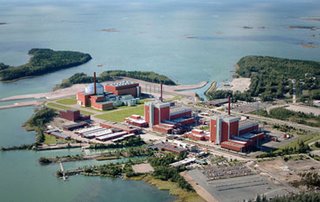Greenpeace and the Magic Documents - How they are mongering scares and totally missing the point about nuclear power - it's too expensive chuck
Readers will know we here at Forth Coming UK Energy deficit (FCUKED) have been following the construction of the new nuclear Reactor Olkiluoto 3 by Areva for a very long time . See official progress update here.
Now Greenpeace in a fine piece of mongering nuclear scares has published an article "Safety procedures in disarray at Finland’s Olkiluoto 3 nuclear construction site" under the banner They say rather excitedly in the manner of a tabloid
They say rather excitedly in the manner of a tabloid
..."Documents (what, where, who the authors are, source etc., unstated) seen by Greenpeace show that French company Areva is failing to implement vital safety procedures in the troubled construction of its prototype European Pressurized Water Reactor (EPR) in Olkiluoto, Finland. As well as being 2-3 years behind schedule, 70 per cent over budget, and experiencing 1,500 construction defects along with a damaging fire, the reactor’s safety cannot be guaranteed."
These magic documents they claim show that "Bouygues, an Areva sub-contractor, has had no qualified welding supervisors at the site for over a year and still does not have any. Staff are given a mere two weeks’ training instead of having the international standard university degree. The company also listed people who had not worked in the role as welding supervisors."
Then in the finest tabloid why oh why fashion they fashion questions based on these magic and unseen and inacessible to the reader documents.
"It is clear that there can be little public confidence in the construction of the Olkiluoto 3 nuclear reactor. How and why are we to believe assurances on matters of safety from the likes of Areva now and in the future? "
Then the MOnbiot calculus is brought into play ..."Think of a number ... er.. make it bigger"
" ..... why should we tolerate or allow such attitudes, incompetence and deception in the construction of a nuclear facility which, in the event of an accident, could cause massive, unquantifiable damage to our health and the environment? "

The Finnish Radiation and Nuclear Safety Authority (STUK) rejected Greenpeace's claims about serious security related flaws in welding work done at the Olkiluoto nuclear reactor construction site.
Petteri Tiippana, section head at STUK, told the Finnish News Agency (STT) yesterday that the STUK has closely monitored essential welding jobs. Some deficiencies were detected last summer in less important assembly welding, but they have been ordered to be fixed already, Mr Tiippana said.
According to Mr Tiippana the claims made Tuesday evening by a Finnish Broadcasting Company (YLE) television programme that the French Bouygues construction company would have forbidden its employees to report problems at the Olkiluoto construction site were far more serious.
"Such a working culture is not suited for a sensitive field like this under any circumstance," Mr Tiippana said.
A request for clarification has been submitted to Finnish utility Teollisuuden Voima (TVO), which has overall responsibility for the construction site.
The Finnish nation has taken immense care in developing Olkiluoto 3 and the public was allowed a referendum on the decision. Never before or since has there been so much public consultation and transparency.
STUK is a highly rational, competent regulatory authority.
Lord Patel has submitted a request for clarification of the Documents that greenpeace have seen.
Future problems with nuclear power
Safety is a continuing concern (not a problem) , good design practice, competent monitoring and regulation should ensure that problems in use do not occur.
The problem with nuclear power is one of cost of the electricity produced. see Thursday, May 29, 2008 Hutton , Brown call for "a significant expansion of nuclear power " ... well up to a point Lord Copper
In April this year two major (and well informed) Utility figures spoke about the concerns that a nuclear revival could be slowed or even halted if the current supply chain crunch ends up pricing nuclear out of the market.
Gerd Jaeger, is an engineer and Executive Vice President of RWE Power AG, he has warned vendors must "de-bottleneck the bottlenecks" at the front end of the nuclear power plant supply chain. Because of a shortage of manufacturing capacity for large forgings, vendors are asking potential customers to commit far in advance of concrete reactor projects.
Sandor Liive, CEO of Eesti Energia, the Estonian state-owned utility, said his company is considering several options for nuclear power because "nuclear is an option that any energy company that wants to be competitive in the future has to consider."
Among the options are construction, with Latvia, Lithuania and (perhaps) Poland, of a new plant at Ignalina, participation in a new reactor in Finland, and construction of a domestic nuclear plant.
Liive said Eesti Energia was "thinking about nuclear" only because the cost of domestic power production from oil shale was rising above the projected cost of nuclear power from new plants, at around €45/MWh.
HERE IS THE IMPORTANT POINT
At that level, which implied a capital cost of €2 million a megawatt, new nuclear was attractive, he said. "But if it were €3 million per MW and €65-70/MWh, there's no point" in investing in a new nuclear plant, "at least from Eesti Energia's viewpoint." (If the 1,600-MW Olkiluoto comes in at €5 million plus we are looking at well over €3 million per MW )
THAT WAS THE IMPORTANT POINT - GEDDIT ?
Material cost pressures affect all energy generating projects -- CCGTs, coal, wind, hydro, wave , not just nuclear.
RWE's Jaeger has revealed that nuclear power plant vendors are asking utilities to put down "hundreds of millions of euros" to reserve large forgings needed for the nuclear steam supply systems of modern reactors. It was "prohibitive for an investor" to commit such sums "at a very early stage of a project," when they did not know if the project would proceed.
Jaeger said that even in countries where new nuclear plants were on the agenda, "it's rather difficult to convince all the decision-makers" who need to act before a plant can be ordered and construction started.
He cited the need for public debate, time needed for regulatory approvals, and "the political environment" as uncertainties in a nuclear plant project schedule. Jaeger said "innovative approaches" were needed to finance new nuclear projects, in which risk is shared equitably among all parties.
 It is evident that Gormless Gordon and his merry crew haven't a clue of the problems in even placing initial contracts for the first plants, the costs involved, the problems of manpower, especially skilled engineers. He is of busy balancing global supply and demand of the 300US$Trillion global oil market by easing the Petroleum Development Tax on 30 minor fields in the North Sea which were opened prior to 1993.
It is evident that Gormless Gordon and his merry crew haven't a clue of the problems in even placing initial contracts for the first plants, the costs involved, the problems of manpower, especially skilled engineers. He is of busy balancing global supply and demand of the 300US$Trillion global oil market by easing the Petroleum Development Tax on 30 minor fields in the North Sea which were opened prior to 1993.Oh Yes! He has also issued some more onshore licenses for oil which currently yields less than 1% of UK production and less than 1/2% of demand. every little helps - or the Treasury candle ends philosophy.
PS Tata of India is considering (15th August 2008) investing in new nuclear plant and they quote that General Electric of the US has developed an economical simplified boiling water reactor with a capacity of 1,500 MW per unit. Two such units will cost anywhere between US$2.75 and 3.25 billion. This represents a cost today of €4.5 to €5 billion for 2.2 MW or €2. 5 per MW.
Westinghouse of the US also has its advanced pressurised water reactor technology of 1,100 MW per unit capacity, costing US$3.5-4 billion for two units = less than €2. 0 per MW.
So Tata say " the minimum investment for us will be at least US$3 billion. We will go in for at least two units having a total capacity of 2,200-3,400 MW."
Presumably these are bang up to date costs - India has lower constructions costs, lower land costs, no planning problems etc.,
Tata made this announcement after the proposed nuclear cooperation agreement with the United States ( agrred with Dubya when he visited) cleared another hurdle, after the International Atomic Energy Agency unanimously approved the deal last week. Before coming into effect, the deal must still be approved by the Nuclear Suppliers Group and ratified by the American congress.
The controversial U.S.-India agreement would provide India with access to global nuclear fuel and technology in exchange for regulatory access to its civilian nuclear facilities. Its critics continue to attack India’s refusal to sign a nuclear nonproliferation agreement.
UPDATE : URANIUM COST
See graph above and also - "Uranium futures continue to paint a bright picture. August contracts are worth US$66, September futures are worth US$67, October US$69, November US$70, and December US$72. Looking further ahead, we find June 2009 futures worth US$74, and September 2009, December 2009, and March 2010 futures all worth US$78."










